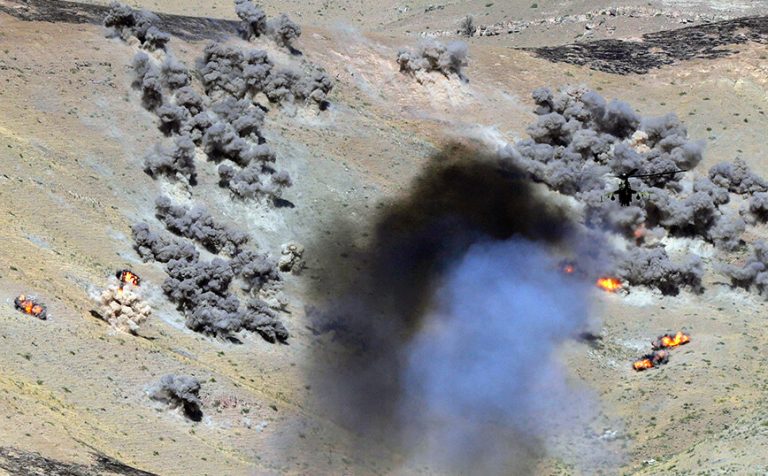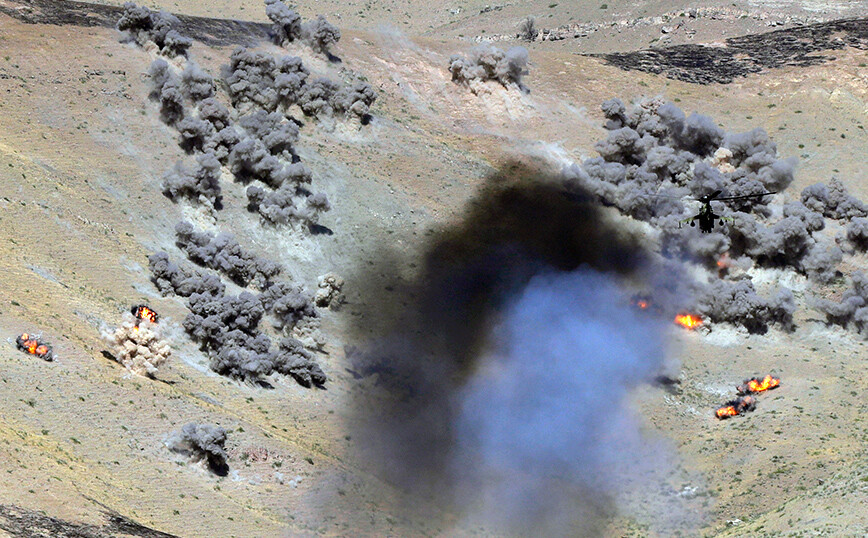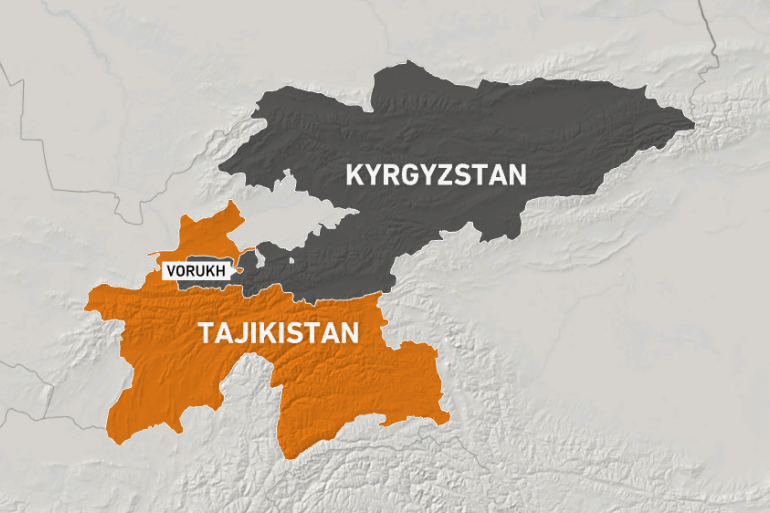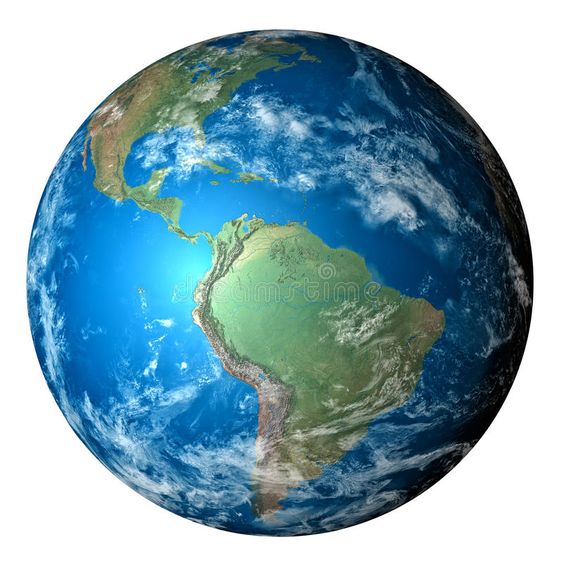
 Referring to reported clashes was over water rights between the two impoverished Central Asian republics of Tajikistan and Kyrgyzstan, the author traces the history of their dispute and the water fights occurring in other parts of the world
Referring to reported clashes was over water rights between the two impoverished Central Asian republics of Tajikistan and Kyrgyzstan, the author traces the history of their dispute and the water fights occurring in other parts of the world
By Tom Arms
One of this week’s lesser-reported clashes was over water rights between the two impoverished Central Asian republics of Tajikistan and Kyrgyzstan. It deserved more attention. Central Asia lies at the heart of the Eurasian land mass. The headwaters of its rivers provide water to half of the world’s population. But climate change and the consequences of the break-up of the Soviet Union are destabilizing this strategic and too often ignored part of the world.
For centuries the five stans (as they are often called) were a prosperous key trading link in the Silk Road connecting China and Europe. The ancient city of Merv in Turkmenistan was the world’s largest in the 12th century. It is now an abandoned ruin. Between 1861 and 1885 the five stans were absorbed by the Russian Empire. They tried to break away after the collapse of the Tsar, but were reconquered by the Bolsheviks in 1925 and fell behind the Iron Curtain and out of international politics for the next 66 years.
There were good and bad elements to Soviet rule. One of the good ones was that the Soviets established a trans-stan barter system that prevented the five states from squabbling over water. Eighty percent of the region’s waters originate in in the mountainous regions of Kyrgyzstan and Tajikistan. The other countries are mostly desert and rely on water from the Syr Darya and Amu Darya Rivers to maintain their agricultural industries.
 The desert countries, however, are rich in gas and oil. So, Moscow devised a system whereby the water-rich mountainous stans provided the desert stans with water during the spring and summer and the desert stans provided cheap fossil fuel energy to Kyrgyzstan and Tajikistan to prevent them from freezing in the winter.
The desert countries, however, are rich in gas and oil. So, Moscow devised a system whereby the water-rich mountainous stans provided the desert stans with water during the spring and summer and the desert stans provided cheap fossil fuel energy to Kyrgyzstan and Tajikistan to prevent them from freezing in the winter.
The barter system lasted for a few years after 1991 and then fell apart as the energy rich stans discovered that they could earn more money selling their gas and oil to foreign buyers. The water-rich stans were forced to resort to hydro-electricity to replace energy supplies from their neighbors. This reduced the flow of water to Uzbekistan, Kazakhstan and Turkmenistan with the inevitable impact on their farming communities.
Climate change is further exacerbating the problem. Most of the water feeding the mountainous rivers originates as melt water from snow, permafrost and glaciers. Over the past 50 years the glaciers in the Tien Shan and Pamir Mountains have been reduced by 30 percent. A further third is expected to disappear by 2050. In the short term this creates a flooding problem, but in the medium to short term there is the greater danger of long-term Central Asian drought and desertification.
This would inevitably lead to increased political instability in an area bordering unstable Afghanistan and creating headaches for China, Russia, Pakistan and India. It is unsurprising that Central Asian universities have established courses in water diplomacy.
It is not only water for the Central Asian republics that are impacted by climate change. The glaciers of the Himalayas and Hindu Kush feed the Indus, Ganges, Mekong, Yangtze, Yellow, Brahmaputra and Irrawaddy Rivers.
The upper reaches of these rivers provide opportunities for hydro-electricity, especially in China which is under increasing international pressure to replace its polluting coal-fired power plants with green technology. Beijing has built 11 dams along the Mekong River and has plans for many more. The Mekong is the main water resource for Laos, Thailand, Cambodia and Vietnam and the reduced water flow is having an impact on the farming and fishing communities in those countries.
Water fights are occurring in other parts of the world. Ethiopia is putting the finishing touches on the Grand Ethiopian Renaissance Dam (aka GERD) which will dam the upper reaches of the Nile at the expense of downstream Egypt and Sudan. Cairo has threatened war and Ethiopia has banned flights over the dam construction site.
Syria and Iraq have been in dispute for years with Turkey over its damming of the headwaters of the Tigris and Euphrates rivers in the Armenian highlands of Northeast Turkey. So far the Turks have built 22 dams for hydroelectricity and irrigation purposes. Their impact on downstream farming communities is said to have contributed to instability in Syria and Iraq.
In Colombia water shortages caused by climate change pushed the Colombian government in 2000 to privatize drinking water in Cochabamba. The result was violent protests which escalated into the “Water War of Cochabamba” and nine deaths. The water was quickly renationalized but the basic problem of shortages is worsening.
To conclude this bleak scenario on an upbeat note, I should note the Indus Water Treaty between India and Pakistan. Within months of partition, India’s East Punjab had cut access to water for Pakistan’s West Punjab and the two countries were on the verge of war. It was narrowly averted and the two countries—with the help of the World Bank—took 12 years to reach an agreement on sharing the river’s resources. It has held firm ever since. If the two arch-rivals of the sub- continent can establish a working agreement on sharing water resources than surely there is hope for diplomatic solutions elsewhere in the world.
 World Review
World Review
- The success of Brexit depends on a willingness to succeed and the desire to place the shared requirement for European stability before narrow political interests. This week’s Anglo-French dispute over English Channel fishing rights indicates that it ain’t gonna happen. British Prime Minister Boris Johnson has again demonstrated his disdain for international law by slipping in additional restrictions related to the licensing of French fishing boats and the French over-reacted by threatening to block electricity to the British Channel Island dependency of Jersey. President Emmanuel Macron then added fuel by giving his blessing to a French fishermen’s blockade of Jersey and Boris went over the top by dispatching Royal Navy ships to the scene. The reason for this diplomatic comedy of errors (although no one is laughing) is the fishing clauses in the EU-UK Trade and Cooperation Agreement. Both the British and French fishing industries demanded that their negotiators secure a win-lose agreement in their favor. Or, at the very least, the semblance of a win-win deal. Instead, both constituencies have suffered what they regard as a lose-lose deal. British fishing communities were a rich source of pro-Brexit and conservative votes. Now they feel cheated and are turning on their former hero Boris Johnson. His dispatch of the Royal Navy is meant to demonstrate his willingness to fight the fishermen’s corner. President Macron faces elections in 12 months. Jean-Marine Le Pen, leader of the right-wing National Rally, is edging ahead in the latest polls. She has a strong base of support in the French fishing community. Macron needs to erode that if he is stay in the Elysee Palace. Both Boris and Macron backed down almost immediately as wiser heads in Brussels and Whitehall prevailed, but if their shoot-from-the hip reaction is a harbinger of things to come than expect a rocky road in post-Brexit Anglo-French and Anglo-EU relations.
- China and Russia were the main focus of this week’s meeting of G7 foreign ministers in London. China was attacked for its lack of human rights and economic policies, and Russia was berated for using its military to destabilize Ukraine and upset the nuclear balance. The Western tactic (as far as China is concerned) appears to be to call on Beijing to recognize its obligations “under international and national law.” They are counting on China’s growing stake in the globalized economy to lead them towards reason. But that was not how President Xi Jin Ping saw the situation in a 12,000-word keynote speech reported this week in the Chinese Communist Party Journal Qishi. He told party cadres that in the midst of world turmoil their party and government had a development plan which made China “invincible.” It combined a secure place in the globalized international division of labor while at the same time, husbanding capital and safeguarding national security with restrictions on key industries. Russia is a slightly different and possibly more worrying concern. In the long-term it does not pose the same economic and political threat as China, and President Vladimir Putin is dropping in the opinion polls. But the paranoid Russian bear finds itself cornered and, many Russian-watchers fear, may lash out using its residual military might from Soviet days. Reinforcing fears of Russian intentions is their clear plan of building a fortress economy to withstand Western sanctions. At the end of 2020 it had $183 billion in its international reserves—equivalent to two years of imports. Some of the money has been spent on covid relief measures, but very little compared to Western efforts. The central bank has shifted holdings out of Americans banks and reduced investments in American businesses from 30 cent to seven percent. In short, while the G7 countries are debating measures to increase the effectiveness of Western sanctions against China and Russia, both countries are taking actions to reduce the effectiveness of sanctions and increase their scope for political maneuver.
- Also on the G7 foreign ministers’ agenda was the problem which refuses to go away—coronavirus. Two specific items were discussed: India and the problem of vaccinating the developing world. An Indian delegation was invited to the face to face summit in London, but at the last minute two members of the Indian delegation tested positive for covid-19 and so the delegation was forced to attend virtually while others gathered for a socially-distanced meeting in a London conference room. India was invited for four reasons: it is the world’s largest producer of vaccines; it has a proposal to extend the vaccination program to developing countries, it is the new epicenter of the pandemic and Prime Minister Narendra Modi’s policy of politics before lives is a textbook case of how not to combat a pandemic. Ignoring scientific advice and the experience of the rest of the world, Modi allowed political rallies and Hindu festivals to go ahead. He has paid the price in humanitarian and political terms. This week daily new cases in the sub-continent reached the 400,000 mark. Largely as a result of the pandemic, Modi, the BJP and his vision of a Hindu nation was trounced in the recent elections in the key state of West Bengal. This was in spite of a full-on campaign by the Prime Minister. G7 foreign ministers, however, were more interested in an Indian proposal that the worldwide coronavirus vaccine program be enhanced by increasing vaccine production in developing world countries. Immunization programs in the West are started to have a positive effect, but the current surge in India underscores the danger of a new vaccine-resistant variant evolving in the developing world and spreading back to the West. A proposal from India and South Africa is to allow the developing world countries to establish their own production lines which would significantly reduce costs and increase production. This has secured the delayed support of the Biden Administration, but is opposed by the UK and EU who are concerned about the financial impact this would have on the profit margins of pharmaceutical companies and the subsequent money available for re-investment in research. They prefer increasing contributions of cash and vaccines to the developing world through the World Health Organization’s Covax scheme. Lack of consensus in London has meant that a decision has been passed to the WHO to come up with a compromise solution.
______________________
About the Author
 Tom Arms is foreign affairs editor of Liberal Democrat Voice and is based in London. He has nearly half a century’s experience of world affairs, and has written and broadcast for American, British and Commonwealth outlets. Positions he held included foreign correspondent, diplomatic correspondent, foreign editor, editor and founding CEO of an international diary news service. He is the author of “The Encyclopedia of the Cold War,” “The Falklands Crisis” and “World Elections on File.” His new book “America: Made in Britain” is due to be published in October.
Tom Arms is foreign affairs editor of Liberal Democrat Voice and is based in London. He has nearly half a century’s experience of world affairs, and has written and broadcast for American, British and Commonwealth outlets. Positions he held included foreign correspondent, diplomatic correspondent, foreign editor, editor and founding CEO of an international diary news service. He is the author of “The Encyclopedia of the Cold War,” “The Falklands Crisis” and “World Elections on File.” His new book “America: Made in Britain” is due to be published in October.